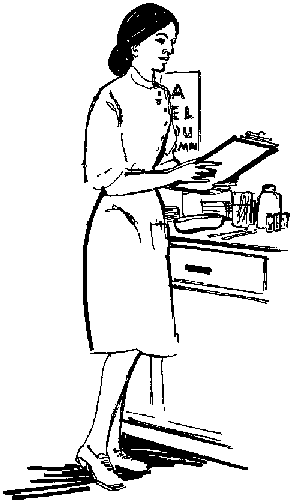
9.1 We were interested to know, if the medic works insufficient time to qualify for a partnership, how the nurse managed to become a partner.
9.2 The nurse answered: "I do a lot more work than the medic. All the little industrial accidents, all the injections for the children, most of the referrals - all the routine things that are the basic income of most medical practices. The medic usually approves the referrals and other documentation that I prepare for him. Although surgery is only eight hours each week, I am here four days each week for all the routine work. All that the medic said is true of course, but because of the limited time he spends here I think his perspective is necessarily narrow. In the story he told you about the bus accident, for example, and the ‘uncanny co-ordination’ of the partners - it was not so uncanny. Everyone knows everyone else here very well and the strengths of each partner are known to be available in any emergency without question. What happened in that case - I know, I was the nurse involved - was that the partners recognised a high priority and responded accordingly with the necessary skills and equipment to deal with the problem. There was nothing miraculous about the incident it was just the normal behaviour of a committed Christian group in partnership."
9.3 The medic interjected: "I accept what you say, and recognise that you spend many more hours than me in caring for these people, but I think you were a little harsh on my use of the word ‘uncanny’. Most accidents are attended by State ambulance and fire services in the same way, but never have I seen such perfectly co-ordinated first aid as I saw there."
9.4 The nurse responded: "Yes, but don’t you see that this behaviour is merely the result of decades of co-operative thought and practice? Accidents elsewhere that you are comparing with are attended by people who don’t know and don’t care about each other and consequently are much less efficient in dealing with such a problem."
9.5 The nurse walked with us to the factory building, which was next on our tour. On the way we asked her how she could continue to be so satisfied in her work when she is doing more than the medic and is probably getting paid considerably less. She took a deep breath and answered: "You have asked a lot of me in the space of a short walk! Briefly, the situation is that I would be very happy to be a partner even if I received far less than the medic. It so happens that I am not in that position however, since this is a very profitable enterprise. I receive considerably more than the medic from The Partnership, as do most of the partners. Data on each partner’s drawings is available to every partner as are all the consultant fees paid, and I assure you that I have checked these numbers out. If you are surprised at this and would like to check it out for yourself, you will have to learn more about the Rules so you can be in a position to see how the income of The Partnership is distributed among the partners. Regular lectures are given on the subject."
9.6 The nurse concluded: "You may be interested to know that a significant part of my time is spent in the outside community as directed by the board. On several projects additional people have been temporarily assigned to work with me, as on the famine relief project last year: The Partnership decided to give money and two people were assigned to work with me to ensure that the money reached its mark fully intact with none being siphoned off by the corrupt hierarchy. This was full-time work for the three of us: The Partnership credited all the hours spent to our records."
From The Partnership, by Graeme Doel.
Converted to HTML by Simon Grant, 2003.